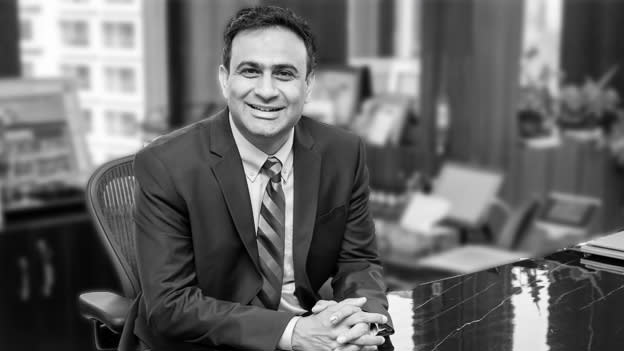Technology will enable HR to deliver bigger value in the future: CHRO, Diageo India

Technology, automation, changing workforce models, and a diverse workforce are transforming not only the nature of the organization but also the traditional role of the HR department. What will this role look like in the future of work? Will it be replaced or reinvented? And what does it need to do to earn its place in the future of work? What should be an HR leader’s next curve?
In an exclusive interaction with People Matters, Aarif Aziz - Chief Human Resources Officer, Diageo India shares his thoughts on the changing role of HR in the future of work. Aarif leads the HR function at Diageo India and is part of its Executive Committee. At Diageo India, he is responsible for building people and organizational capability aligned to deliver the corporate objective of building capable leaders and attracting the right talent.
Here are a few excerpts from the interview-
Do you think your role as an HR leader will continue to exist in the future landscape of work? If yes, how will it have changed?
I think all functions be it HR or Finance, will stay relevant. Because our focus, the work we do, and the way we engage, we have changed significantly. If I look at my journey as an HR leader and see where I have spent the maximum efforts, a significant portion of them has been spent on processes. A lot of work has also gone into improving our HR systems for delivery. So continuous improvement and change management is another area where we have spent considerable efforts. Some part of it has also been spent on coaching, in building the right culture.
If I look into the future and the way technology is advancing, I would say much lesser efforts will be needed in creating solutions. As many more intuitive solutions will be available, as an HR leader, I would not have to spend time in creating solutions. Similarly, much less time will be spent on how we do the delivery on talent. A lot more time will be spent on how I treat each person uniquely and have a better understanding of people. How much I understand, how better I understand talent, will be the differentiating factor.
Also, HR will need to understand that skills will become irrelevant in a short period of time. You cannot make a manpower plan for one year and then expect everything will fall in line. Things have to be a lot more dynamic- so how you continuously reskill your workforce in changing times, how you create platforms today for regular training interventions and a culture where people are willing to learn. Similarly, coaching also has to be in a context versus isolation.
“So, as an HR leader, how am I able to relate to the business context and coach people is going to be a lot more important. That is going to be my biggest delivery in this function.”
As an HR leader, what are the two key aspects of your role that you will no longer be engaged with in the future of work?
HR leaders in the past have spent a lot of time in creating new processes-be it a talent review process or a new compensation practice or managing administrative functions. Today we have a plethora of intuitive tools in the market to do these jobs. I don’t have to create a tool to manage talent. So process delivery, process design will significantly go away. HR’s role will be more about how they leverage these tools to create value for the organization.
“With the advent of more AI and technology, HR will be able to deliver much bigger value and a bigger partnership.”
In your opinion, will HR be managing people or robots OR both in the future?
Robots and automation is the reality. With the advent of chatbots, questions have arisen that if they are going to engage with the employees, what’s going to be HR’s role? But we should welcome them because by having the first level conversation with employees, chatbots will help us build on what’s going on in the minds of employees.
“As compared to a one-way, static employee survey, with chatbots, the conversation will be more meaningful and relevant.”
However, the human connection has not gone and will never go. People value human connection as, in the end, we are social creatures. The first level information provided by chatbots will enable HR with ample data to design solutions to engage and grow their employees. So technology will equip HR to engage in a much smarter way to engage more meaningfully, not just to diagnose but to solve.
How do you envision the future of work and the role of next-gen technology in redefining the role of HR?
First, technology will make HR’s role more meaningful and impactful. We must accept that there are jobs which will become redundant. If today you have a job which is all about data crunching and churning reports, it may not remain as valuable. Secondly, the ratio of HRM to employees may change because a lot more insights and data will be available from automation, and the engagement will comprise of more meaningful conversations and connections.
Also, if you are not embracing data, analytics, and technology, you will feel completely alien in the new world. Your value add to the organization itself will change and people will see that you are not making an impact.
Amidst a constantly changing work environment, the advent of new technologies, and the demands of a diverse workforce, what do you think will be your #NextCurve as a people leader?
As a people leader, there are two big things on my mind-one is how do I completely enable my team to push the envelope and try new things. As a people leader, you may not have all the answers, and the number of years of experience may actually be a liability. So how do I create that environment where everyone feels we have an equal voice on the table to be able to make a difference-that is my focus.
Secondly, there is tremendous fear of technology and people are apprehensive. How do I create an environment where my team is more embracing of technology and does it on their own versus it being a top-down initiative-because honestly, that will be our biggest differentiator. It can help us to add impact by focusing on higher-value versus focusing on diagnostic transactions.











